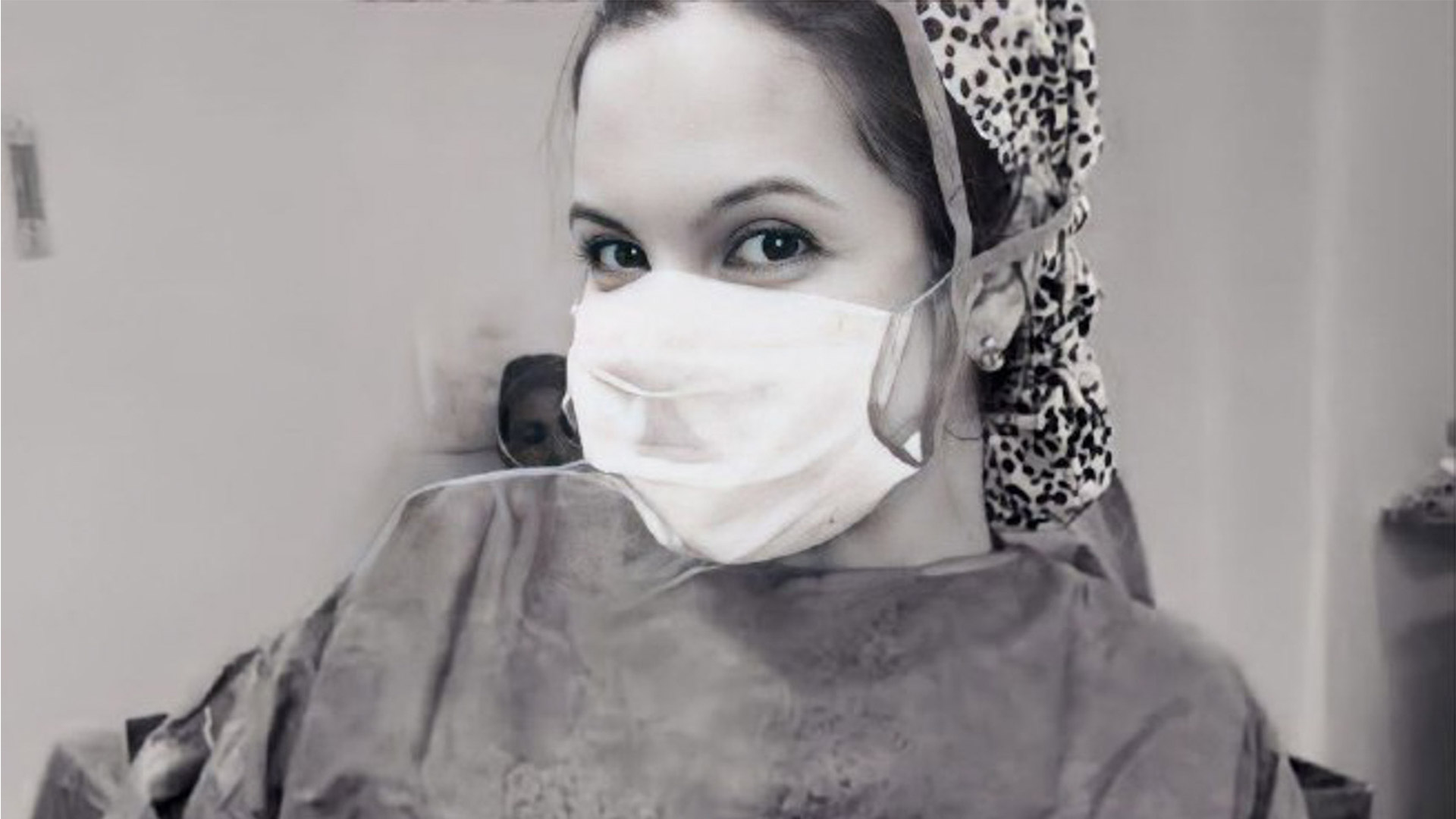

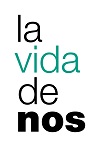
Nathali Arismendi was still a medical student when, during one of her first shifts, she pricked her finger while suturing a head wound on a homeless woman. Weeks after that work-related accident, she developed a fever and her lymph nodes got swollen. An HIV test came back positive, but she had no doubt in her mind that she had been misdiagnosed.
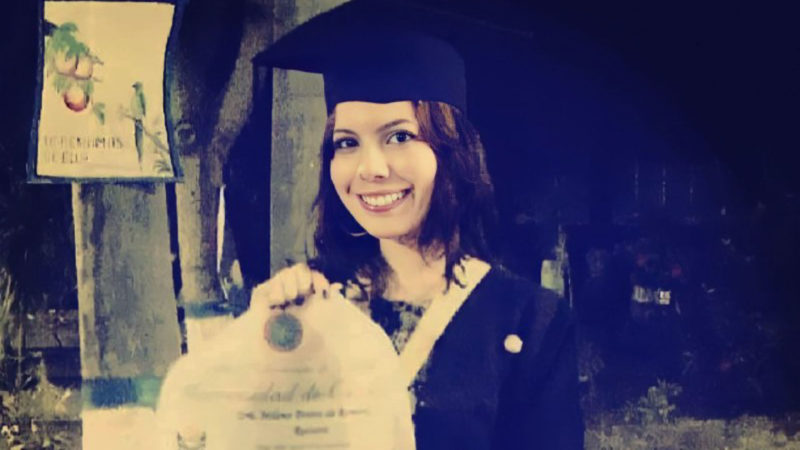 PHOTOS: FAMILY ALBUM
PHOTOS: FAMILY ALBUMI thought of my 4-year-old preschool self, delighted with my first book on the human body; and of my 6-year-old self, pretending that I listened to my relative’s hearts with a plastic stethoscope. I was bornto be a doctor. But, at that very moment, I hated my profession. I hated patients. I wished I had chosen differently. Why didn’t I pursue a career in administration, as my grandmother wanted? Or as a writer, which was what my grandfather thought I would be when I grew up? And there I was, in a gloomy hospital office with two of my classmates, my face swollen and red from crying, listening to a lecture on the human immunodeficiency virus.
There was no turning back time. I had just been diagnosed.
Why me? I didn’t even have a partner and had never had sex. “It is not fair!” I said to myself.
It all happened at the beginning of 2009. I don’t remember the month exactly. I know I was halfway through medical school. Weeks earlier, I had arrived at the hospital at 7:00 p.m. wearing my new uniform and a real stethoscope, ecstatic because it was my first shift ever. I was studying surgery as a 6th semester course and I was supposed to have already learned the basics of direct contact with patients. My classmates and I introduced ourselves to the specialists and residents on duty. Some of them were instructing us on the things we could actually do. They suggested that we be ready to learn about any procedure that should be required that day for practice and dexterity.
I headed with other fellow students to an emergency room known as the quirofanito [the ‘teeny-tiny OR’], which was a small, unsanitary space with walls and floors splattered with blood and other fluids. It reeked of rust, urine and pus. It had soiled stretchers. And it had a stainless steel table with boxes of suture threads and clamps, sterilization products, probes and other medical supplies.
A surgical resident was attending to a woman who had just arrived at the center. The patient smelled of ethyl alcohol and her clothes were torn and dirty, as if she had crawled from a mud hole. Her hair was covering her face as they were cleaning a wound on the back of her head.
We were shocked by the amount of blood gushing out. It came out so profusely that one of our classmates passed out and had to be carried by two of our peers to our designated rest area to recover. The medical resident cracked up at what had just happened and told the two of us who were still standing to put on some gloves so we could learn how to suture a wound.
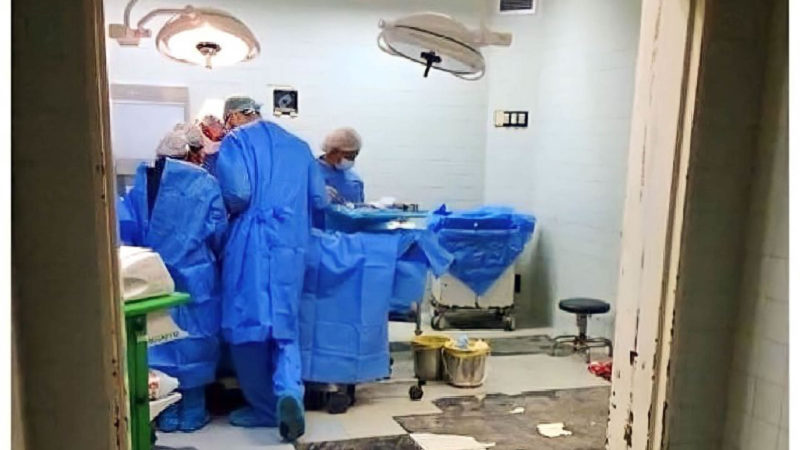
He asked me to be careful. I was scared. Although I knew the whole theory, it was the first time I had ever used a suture clamp, and I did not know how much pressure I needed to apply for it to open or close; and it was the first time I had ever experienced the feeling of piercing through someone’s skin with a needle. The patient appeared to be homeless. I don’t know how she was admitted to the hospital, because she carried no documentation. She said her name was Carolina. She said she had been involved in a fight and that she was hit with a blunt object. She was drunk and couldn’t stay still. On my third attempt to insert the needle into her skin, I pricked my left thumb.
“Work-related accident.” I had never ever heard of that expression. I was instructed to remove my gloves, wash my hands, and notify the head nurse on duty so he could check me and prescribe treatment and give me some instructions. “Why all the fuss?” I thought. I kept quiet. I didn’t want them to make fun of me if I overreacted or over my clumsy first attempt at suturing.
About a month later, I started to feel sick. I was running a high fever and my lymph nodes had gotten swollen. I felt lumps the size of golf balls in my neck, near my ears and in my groin. I was concerned because they were large and painful. A classmate decided to go to one of our professors, who happened to work as a doctor at an epidemiology center, and tell her about my “work-related accident.” She did it because, during those first shift days, some of our fellow students had gone through a similar experience and a number of patients they treated had tested positive for hepatitis B and C. The doctor contacted me and suggested that I take a blood test. She offered to take me to the lab herself. I reluctantly agreed because the connection between my feeling sick and my “work-related accident” was beyond me.
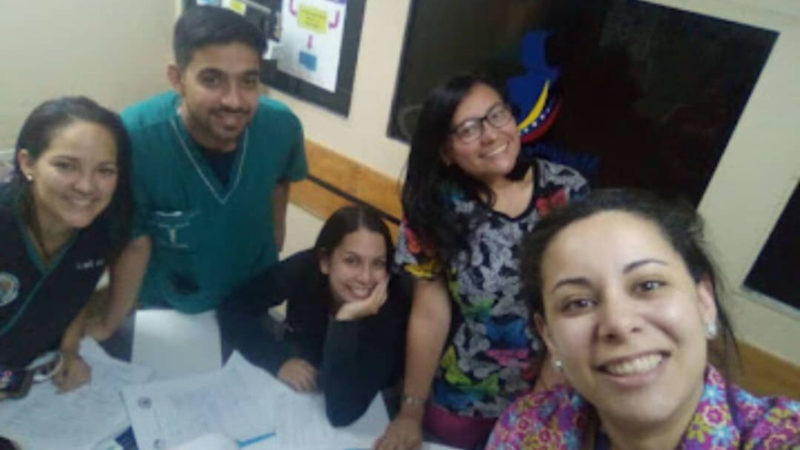
The next day, I received a call from the doctor, who was the regional epidemiology chief in the state of Anzoátegui, in eastern Venezuela, where I lived. She asked me to meet her outside the hospital cafeteria for my results. And she told me not to go alone, so I went with two of my girlfriends. To be honest, I didn’t understand the mystery surrounding the whole thing.
When I arrived, she was in her car. She took my hands and started crying. My mind went blank and I asked her what was wrong.
“I am so sorry, dear,” she said. “I’m saddened to inform you that at such a young age, while studying such a beautiful career, and with a great future ahead of you, you have tested positive for HIV. I’m here to take you to have a sample drawn for the Western/ELISA blot test, which we will send to Caracas for processing to confirm the diagnosis, but I very much doubt that a mistake has been made in your case, because the epidemiology team is used to working with patients with the disease and it is rarely wrong. The only thing I am going to ask you is not to say a word to your parents yet,” she said.
“You’re kidding me, right? That can’t be true…” I laughed.
“I wish I was, but I have the results here for you to see,” she replied.
I was in shock. I was speechless. As if acted on by an outside force, I got into the car with her and my friends and headed back to the laboratory. The bioanalysts and assistants gazed with pity at me and asked the professor if I was the girl of the work-related accident. “Poor thing,” “So young,” “So pretty,” “Her life was just beginning,” “She didn’t have the chance to enjoy life,” “Does she have a boyfriend?” “She must not worry,” they whispered, but I heard them loud and clear.
“Don’t you cry,” they finally said. “What are you going to do?”
And then I burst into tears.
Immediately, I was taken to an infectious disease specialist who worked at the same center. He examined me thoroughly and asked me questions in an effort to figuring out the reason behind my diagnosis. He said he didn’t trust the test results and explained to me that the risk of acquiring HIV, hepatitis B and C from a needle prick injury at the workplace was less than 2 percent. He also told me that it was difficult for a lab test to come back positive after such a recent exposure. And yet, he opened a medical history for me.
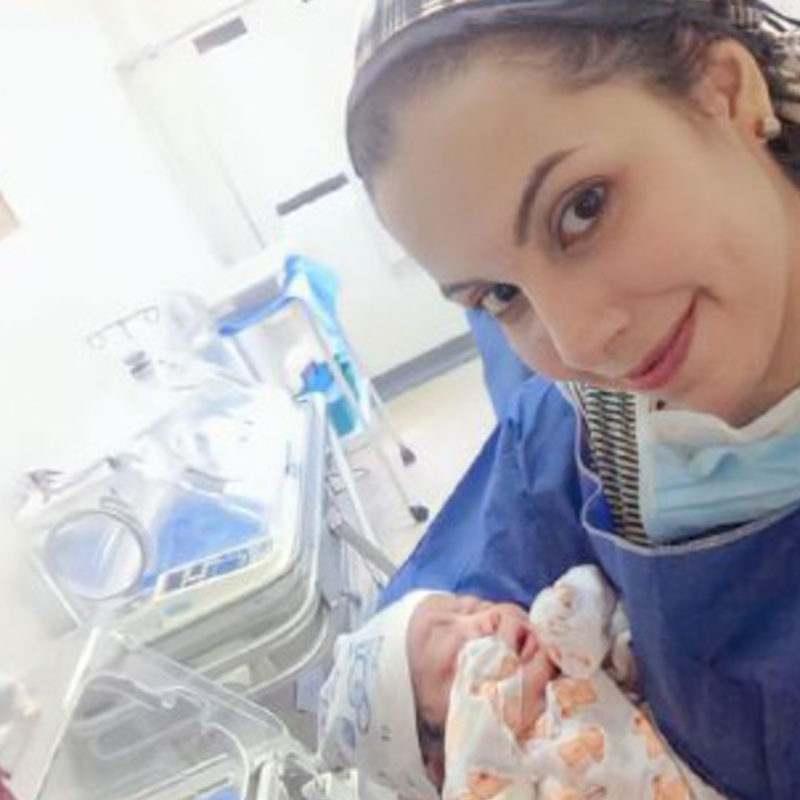
I left his office and went into another large room with several desks. A nurse “tried to cheer me up” and talked to me about how my life as an HIV patient was going to be, what tests I should take to keep the disease at bay, how to prevent my relatives from becoming infected at home, how to cook, what to do if I wanted to have children, how to have sex while reducing the risk of infecting my partner, what my hygiene should be like, what foods I should eat to avoid losing body mass and strengthen my immune system… And she handed me a few bottles of a protein shake and some very strong antiretroviral therapy and stomach-acid reducing drugs which, she said, I had to start taking at once.
At that very moment, I hated having studied medicine. And I hated patients.
A few minutes later, a man in his 40s entered the office. He was cheerful and polite. He noticed I was overwhelmed and asked who I was and why I was crying. He introduced himself and began to talk as if he had known me for a long time.
“Don’t cry, sweetie. It’s not your fault. It was an accident. I know what’s going through your mind right now, but let me tell you that hate is a bad thing. Do not hate the beautiful and challenging career you’ve chosen, and do not hate patients, because we are all born with a purpose, and yours is to serve them. Do not hate the disease.”
I looked at him in silence, surprised by what he was telling me:
“I am a medical doctor myself and I look healthy, as you can see. But, believe it or not, I also have HIV. I acquired it through blood from a transfusion I received for dengue hemorrhagic fever at the same hospital where I work. I found out shortly after I recovered… And what could I do? I focused on the bright side. I’ve lived with this disease and few people know that I have it, so I’m grateful I’m not treated differently. You have no idea how many members of the healthcare staff at your workplace have HIV and other diseases. By the way, I’m married and my wife is pregnant. Neither she, nor my son who is on the way, are infected. I have taken good care of myself and kept my viral load low. The key is to stick to your treatment. That’s why I’m here right now. I came looking for mine. This disease weakens your immune system. People solely associate it with improper behavior and sexual transmission.”
I had classes a few hours later. I went back to the university with those words going round my head. I didn’t want to talk to my friends, my head hurt, and I couldn’t stop thinking. I had to wait an entire weekend for the results of my confirmatory tests. I sat alone on some stairs and cried my eyes out, holding my legs, repeating to myself that my blood was tainted. I thought about giving it all up and vanishing into thin air.
The weekend passed, and so did Monday and Tuesday, which was a terrible time for me because the results came out late.
I was thinking and praying.
Praying and thinking.
The test results came on a Thursday.
I was asked to meet them one afternoon in the green area by the university’s entrance. They told me that the results were negative, that I had to undergo additional testing to rule out other diseases that could have possibly resulted in the false positive, and that I had to repeat the tests I had just taken every three and then every six months.
Boy was I relieved!
As if I had been born again.
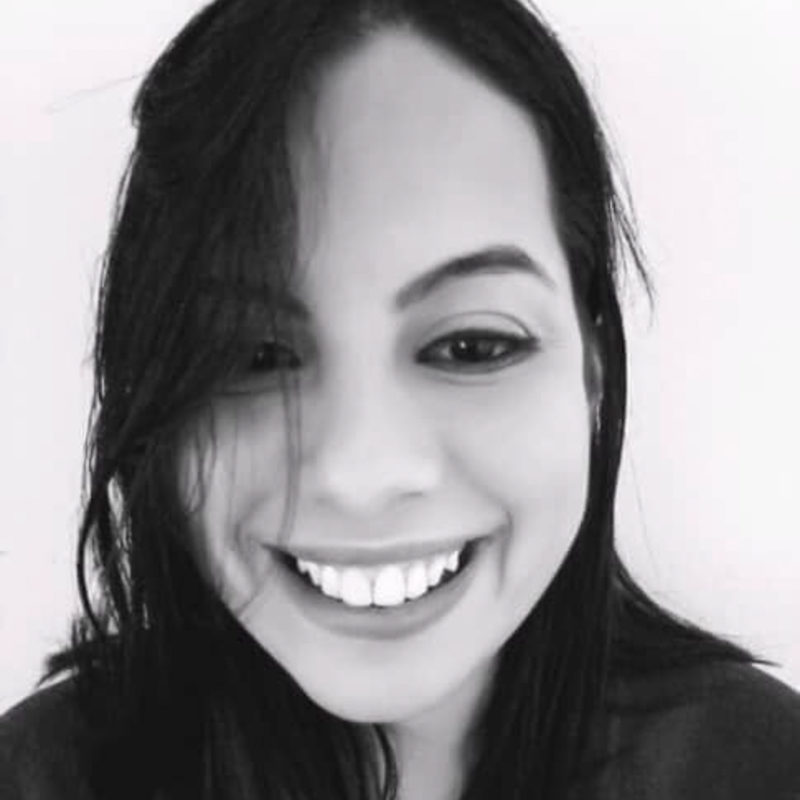
I finished medical school. I reconnected with my love for my profession. I am an OB/GYN. Occasionally, I am reminded of the time I received an HIV diagnosis and of the words that doctor said to me. It’s not uncommon for me to watch colleagues refuse to tend to HIV-patients. I have seen nurses condemn patients to isolation rooms at the end of a hospital corridor, where they stay, their bodies wasted by cachexia, without being given their treatment as scheduled, or food, or without having their room cleaned, only because of the nurses’ fear of becoming infected, or without the company of their relatives, who run away from them and their diagnosis. I’ve seen pregnant HIV-women deny having the disease for fear of being refused care. I’ve seen HIV-patients go give birth without the protective equipment required to perform a C-section safely should the need arise. I’ve seen women abandon their newborns at the hospital as soon as they learn they transmitted the disease to them.
I am always moved to the core by stories that make me repeat, like a prayer, Primum non noncore, which is Latin for ‘First, do no harm,’ the oldest rule in the practice of medicine and the foundation of the Hippocratic Oath. We are all precious creatures. A disease does not define you. That’s why I am a physician. And I am on the side of life and in the business of bringing people to this world.

This story was written within the framework of the Narrative Medicine: Our Bodies also Have Stories to Tell course taught to healthcare professionals via our El Aula e-nos online training platform.
607 readings
I am a Venezuelan GYN/OB who specializes in maternal-fetal medicine. I am an itinerant. I love my family. My life changed with the things I learned at a hospital. It’s no coincidence: I was born to help.